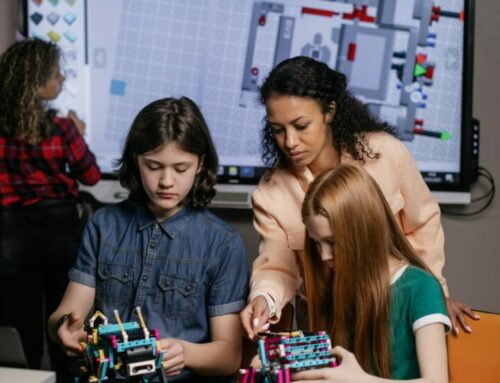Partners in dialogue: Creating meaningful learning environments
Olga Kovbasyuk and Patrick Blessinger
International HETL Association
During the spring semester of 2012, we conducted an online course entitled “Coming of Age on Screen”. The aim of the course was to foster US-Russian dialogues from the perspective of meaning-centered learning and thereby improve intercultural communication competencies. We would like to share our pedagogical experiences from that course.
This course brought together 50 students from the Khabarovsk State Academy of Economics and Law in Russia and Mount Holyoke and Brandeis Universities in the USA. The students and faculty discussed films while practicing Russian and English communication skills. The classes used videoconference technologies, Skype and Facebook to interact with each other, synchronously and asynchronously.
This experience allowed us to address the following questions: How can an open meaning-making environment promote dialogic and authorial teaching-learning strategies and behaviors? How might we decrease unnecessary power distance between instructors and students? How might we integrate transdisciplinary curricula into the learning process?
We structured the interactions in such a way that students and instructors could choose the part of the dialogues they wanted to participate in and that were personally meaningful to them. Students interacted with each other in a Facebook Group called “Partners in Dialogue”. In this way, they were able to share their cultural worldviews in an effort to build rapport and generate trust and respect towards each other.
For example, one project required two students from each university to present their reviews of a film using role-play. One student played the role of an admirer of the film and focused on the film’s positive aspects while the other student played the role of a grumpy critic and focused on the film’s negative aspects.
Another option for learners to participate in the discussions involved personal reflection and sharing their strongest emotions evoked by the film, which we called, “sharing telling moments”. In such discussions, learners were able to compare their own views and meanings with other students’ views and meanings.
We also used “if” questions as a way to evoke the imaginary thinking of learners. For example, “Imagine how the film would be different if Truffaut had made a film about an American (or Soviet) teenager in late 50’s and early 60’s. How would the film be different if it was set in modern times?” This was a question taken from the discussion of the film, 400 Blows.
Through these methods, we attempted to broaden what might be possible in education by constructing a meaning-centered classroom across disciplines, time zones and geographic limitations. Taking ownership of their own learning process was demonstrated by how students constructed their collaboration in globally distributed teams, which films and topics for discussion they selected, what efforts they made to articulate personal meanings (Russian learners spoke in in English and US learners spoke in Russian), and how they assessed their own progress in understanding each other in developing intercultural competence.
The transdisciplinary approach was exemplified by integrating psychology and sociology into the project. For example, when students discussed the film Malena, they prepared questions on the “Lucifer effect”, which required them to read additionally from American psychology and sociology. They learned that Philip George Zimbardo, a psychologist at Stanford University, created this term when he studied social situations that lead ordinary people to commit “unimaginable acts of violence, discrimination, and indifference to the suffering of others”.
As a result of this dialogue, learners expressed concern about bullying in schools, on the Internet and in work place. In the film, they could see examples of such antisocial behavior and shared their personal perspectives on why it happened, and how to improve the situation.
However, creating an open meaning-making environment is not without challenges. One challenge for educators is how to deal properly with “unplanned activities”. For instance, students decided not to write an essay after each of the online discussions, as the instructors had originally planned for them to do, but instead they decided to create their own collaborative group on Facebook, where they could maintain more self-control of the content, and where they felt more empowered to manage their own learning process. Instructors joined the FB group and this collaboration allowed us to restructure the assessment process, as learners progressed.
Another “unplanned activity”, which illustrates the creative agency of students, was when they spontaneously added creative performances (singing songs, guitar playing) to enhance the meaningful learning of art.These unplanned activities seem significant to us as researchers of meaning-centered education. Specifically, we believe our students performed their own songs and music in order to increase the positive affect of meaningful learning.
Thus, we hypothesize that unplanned activities are an attempt on the part of students to promote self-empowerment, self-control and self-assessment, which is an essential attribute in getting students to take more ownership of their own learning which is important in academic motivation.
To summarize, the “Partners in Dialogue” online project illustrates the variability of meaning-centered educational strategies, where students and teachers engage in an open meaning-making process and where they have equal rights and responsibilities on defining, exploring, and negotiating the themes and meanings of the course. This experience allowed us to examine some of the possibilities in the field of intercultural communications. What experiences have worked for you?
Suggested Citation:
Kovbasyuk, O. & Blessinger, P. (2013). Partners in Dialogue: Creating Meaningful Learning Environments. Higher Education Tomorrow, Volume 1, Article 6, https://www.patrickblessinger.com/partners-in-dialogue-creating-meaningful-learning-environments/
Copyright © [2013] Olga Kovbasyuk and Patrick Blessinger
Disclaimer
Opinions expressed in this article are those of the author, and as such do not necessarily represent the position(s) of other professionals or any institution.




